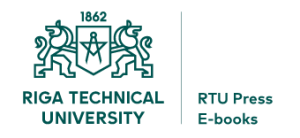Alkali-Activated Aluminosilicate Composites With Heat-Resistant Aggregates for Industrial Applications
Summary of the Doctoral Thesis
Laura Dembovska, Riga Technical University, Latvia
Objective of the research developed in the doctoral thesis is to produce porous, heat-resistant aluminum silicate composite materials from industrial waste and by-products for industrial applications (for example, insulation materials) using alkaline activation technology. As a result of alkaline activation process aluminosilicates are transformed, i.e., in the elevated pH environment silicates and alumina from the raw materials dissociate and polymerize. The raw materials used in the research are metakaolin and chamotte, lead-based glass, ground granulated furnace slag, aluminum scrap recycling waste and heat-resistant fillers. The research carried out in the doctoral thesis focuses on the development of raw material compositions and production technology in order to obtain heat-resistant aluminum silicate composite materials (ASC). Mechanical and physical properties, microstructure, chemical and mineralogical composition, stability under high temperature conditions were determined for ASC. In the doctoral thesis it has been proven that the raw material proportions and chemical composition of the ingredients influence the properties of the ASC and determine their application in the high temperature conditions. The chemical composition of the alkali activation solution has been shown to have a significant effect on the thermal properties of the ASC and determine ASC’s maximum operating temperature. It has been proven, that by increasing the percentage of Al2O3 component in the composition, ASC with higher mechanical properties and thermal stability can be obtained. Within the framework of the doctoral thesis, ASC for the high temperature application (in the temperature range from 600-1000ºC) with material density 350-850 kg/m3, total porosity in the range from 65 vol% to 86 vol%, compressive strength from 1.0-3.0 MPa and thermal conductivity from 0.14-0.16 W/(m K) were obtained. According to the results of a high-temperature microscope and dilatometer, it is concluded that the ASC from alkali activated chamotte with firebrick sawing residues in the high temperature up to 800 °C shows a shrinkage of 0.3-0.5 %, while in working temperature up to 1000 °C material shrinkage reaches 3.1-4.3 %, which meets the standards. One of the main conclusions is that in order to gain a complete view of the physical, mechanical and thermal properties of the material, it is necessary to use different methods (both instrumental and test methods), which complement and justify each other.
Additional information
| DOI | |
|---|---|
| Publication type | |
| Hyperlink | |
| Defence date | 12.04.2019. |
| ISBN (print) | 978-9934-22-232-0 |
| ISBN (pdf) | 978-9934-22-233-7 |
| Format | |
| Pages | 88 |
| Published online | |
| Publisher | RTU Press |
| Country of Publication | Latvia |
| Publication language |
You must be logged in to post a review.




Reviews
There are no reviews yet.